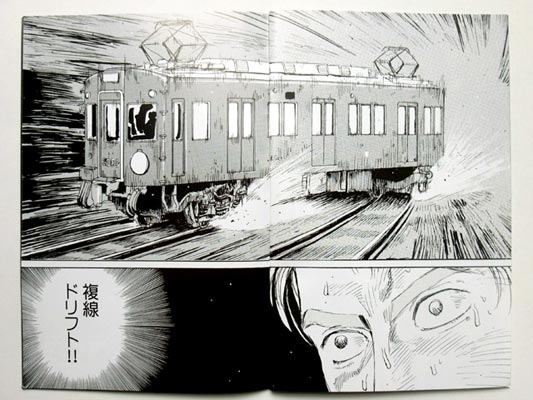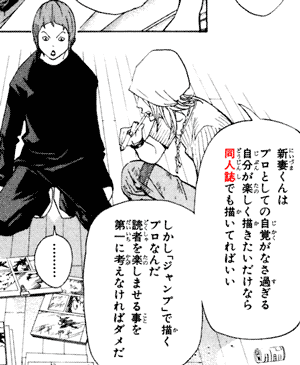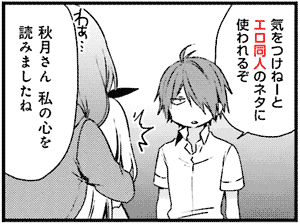In Japanese, doujinshi 同人誌 means a "fanzine," an indie manga 漫画, which may or may not be a derivative work, a parody featuring characters whose copyright is owned by someone else. It's also romanized dōjinshi, dojinshi, douzinsi, dōzinsi, or dozinsi.
Photo source: やまひで's blog, 同人ゲーム「地主一派 電車でD LightningStage」で遊んでみた - type-y.com, accessed 2019-01-09.
Meaning
A doujinshi is an indie manga, drawn by an amateur "manga artist," mangaka 漫画家, or by a professional mangaka on his free time, published using personal resources.
Typically, a professional mangaka, drawing for a magazine, won't have full control over what they draw, there will be an editor from the company checking if the drawings are okay to be published in the magazine.
There will be censorship and some loss of control over creative decisions. The goal of such manga is to make money and entertain an audience.
By contrast, a doujinshi is someone just drawing whatever they want and maybe trying to make some money out off it.
- Context: Fukuda Shinta 福田真太 warns fellow manga artist Niizuma Eiji 新妻エイジ.
- Niidzuma-kun wa puro toshite no jikaku ga nasa-sugiru
新妻くんはプロとしての自覚がなさ過ぎる
Niizuma-kun, [you] lack self-awareness as a professional too much. (literally.)
- {jibun ga tanoshiku kakitai} dake nara doujinshi demo kaitereba ii
自分が楽しくて描きたいだけなら同人誌でも書いてればいい
If [you] only {want to draw having fun} then [you] should just draw a doujinshi. - shikashi {"Janpu" de kaku} puro nanda
しかし「ジャンプ」で描くプロなんだ
But [you] are a professional [who] {draws at Jump}.- Jump is the name of a shounen manga magazine.
- 「」 - quotation marks.
- {dokusha wo tanoshimaseru} koto wo dai-ichi ni kangaenakereba dame da
読者を楽しませる事を第一に考えなければダメだ
[You] have to make {entertaining readers} the number one [priority].- In other words, a doujin draws doujinshi to entertain to entertain themselves, while a professional draws manga to entertain the audience.
vs. Doujin
The difference between doujinshi and doujin is that a doujinshi is a magazine, a comic book, a manga, while a doujin 同人 can be anything, including games, and even anime.
This term means literally "same person," onaji hito 同じ人, in the sense of people that share a "same hobby," onaji shumi 同じ趣味, but it's also used to refer to all sort of products made by hobbyist anime fans, otaku オタク, sold to other otaku.
A doujin product is typically published under the name of a "circle," saakuru サークル, which is group engaged in some sort of hobbyist activity, although some circles contain only one member.
For example, you have a doujinshi created by a circle, and the circle contains only one artist, so that one artist drew the doujinshi. Sometimes a circle contains multiple creators, and each is involved in part of the doujinshi, but they release the whole thing under a single circle name.
Some doujin products have further niche audiences, e.g. the fujoshi 腐女子, who buy BL doujinshi featuring gay ships of male characters with other male characters.
vs. Parody
Not all doujinshi are contain stories parodying something else, although many do.
- Context: Tsunashi Youta 十陽太 talks about tht doujinshi he has to make.
- sessha kakeru anija kapu no orihon de gozaru!!
拙者×兄者カプのオリ本でござる!!
[It] is an orihon with me × [my] older brother as couple!!- Note: using sessha 拙者 as first person pronoun and ending one's sentences with de gozaru でござる are things only samurai characters and otaku do, and this is no samurai.
- Couples are described as A × B are typically ordered as seme × uke 攻め×受け, which means Youta's older brother would be the uke in his doujinshi.
- komike mo chikai shi, ganbaraneba!!
コミケも近いし頑張らねば!!
The comiket is soon, too, so [I] have to work hard!! - orihon: {tokutei no sakuhin wo daizai to shita} niji-sousaku dewanaku, orijinaru no naiyou no hon (ikooru doujinshi).
オリほん[おりほん]:特定の作品を題材とした2次創作ではなく、オリジナルの内容の本(=同人誌)。
orihon: not a derivative work [that] {makes as theme a certain work}, a book of original content (= doujinshi).
vs. Hentai
The difference between doujinshi and hentai 変態, which in English means drawn pornography, although in Japanese it means "pervert," is that they're completely different things: not all doujinshi is hentai, and not all hentai is doujinshi.
Photo source: やまひで's blog, 同人ゲーム「地主一派 電車でD LightningStage」で遊んでみた - type-y.com, accessed 2019-01-09.
- Context: a doujinshi parodying the series Initial D, which is about car racing and drifting, except featuring trains racing and drifting instead.
- fukusen dorifuto!!
複線ドリフト!!
Multi-track drifting!!
A doujinshi that's pornographic is called an ero doujin エロ同人, "erotic doujin," or usui hon 薄い本, "thin book."
- Context: Akizuki Kouyou 秋月紅葉 warns Kanzaki Hideri 神崎ひでり about Amano Miu 天野美雨.
- {ki wo tsukenee} to ero-doujin no neta ni tsukawareru zo
気をつけねーとエロ同人のネタに使われるぞ
If {[you] don't take care} [you] will be used as material for an ero-doujin.
- tsukawareru - passive form of tsukau 使う, "to use."
- neta ネタ - "material" used as base for a news article or fiction story.
- Akidzuki-san, watashi no kokoro wo yomimashita ne
秋月さん 私の心を読みましたね
Akizuki-san, [you] read my [mind], [didn't you].


![拙者×兄者カプのオリ本でござる!! コミケも近いし頑張らねば!! オリほん[おりほん]:特定の作品を題材とした2次創作ではなく、オリジナルの内容の本(=同人誌)。](https://media.japanesewithanime.com/uploads/orihon-danna-ga-ch04.png)

No comments: